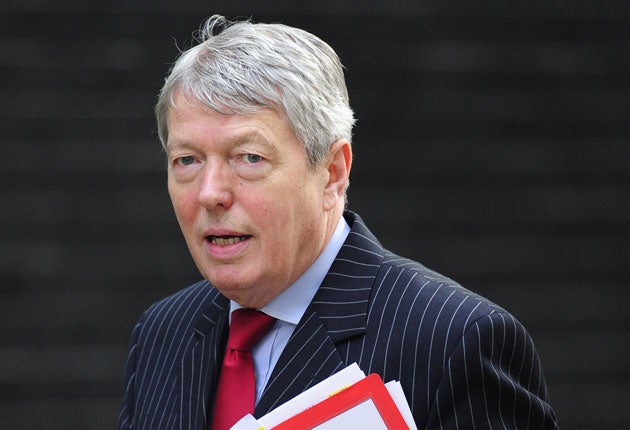Last rites for ID cards read by Johnson
Britons will no longer be required to register for identity cards, says Home Secretary

The Home Secretary Alan Johnson killed off the Government's cherished compulsory identity cards scheme last night, promising that British citizens would never be forced to sign up for them. Critics urged the Government to retreat further and scrap its flagship £5bn policy outright.
Mr Johnson's predecessors had argued that the cards were needed to help tackle terrorism, illegal immigration and serious crime. They suggested that the move to compulsory carrying would follow once more than 80 per cent of the population was covered.
But, in his first major announcement as Home Secretary, Mr Johnson pledged that ID cards would remain entirely voluntary for UK nationals in future, and insisted that it should be a "personal choice" for citizens to sign up. He also abandoned plans to require some pilots and airport workers to carry ID cards in the face of bitter opposition from their unions.
Mr Johnson acknowledged that the Government had been wrong to present the cards as a "panacea" against terrorism. He stressed their value in helping young people prove their age in bars or in acting as an alternative to passports for travellers in Europe.
The climbdown follows a resurgence of cabinet tensions over the scheme. The Independent disclosed in April that senior ministers were raising fresh questions over the future of the ID card programme as they came under pressure to find savings.
The Government has already started issuing compulsory ID cards to foreign nationals and now intends to offer them on a voluntary basis – at a cost of £30 – to UK nationals in Manchester later this year and elsewhere in the North-west of England in early 2010. Other people will start being added to the register in 2011-12, underpinning the scheme when they apply for biometric passports.
But failure to update names and addresses on the register will carry a fine of up to £1,000 – which critics complain will amount to compulsion by the back door.
The Conservatives have already announced their intention to bin the project if they win the next general election. Mr Johnson said yesterday that the taxpayer would save "diddly squat" if the ID cards scheme was axed, as its estimated £5bn cost would come from fees paid by people when they renewed their passports.
He said that he remained a supporter of the concept of ID cards and even wanted to accelerate their introduction. But he repeatedly stressed he wanted them to remain voluntary, making clear that any move to compulsion was off the agenda for good.
"Holding an identity card should be a personal choice for British citizens – just as it is now to obtain a passport," he said. Asked if they would ever be made mandatory, Mr Johnson replied: "No."
David Blunkett, who championed ID cards when he was Home Secretary, originally suggested that they could become compulsory in 2013. The target date was later moved back to about 2018 as practical problems over the scheme mounted.
Plans to run a trial of compulsory ID cards for airside staff at London City and Manchester airports have now been ditched amid threats of industrial action from pilots.
The opposition parties argue that billions of pounds could be saved by abandoning ID cards.
Chris Huhne, the Liberal Democrat home affairs spokesman, said: "This is another nail in the coffin for the Government's illiberal ID cards policy, which will soon be so voluntary that only Home Office mandarins seeking promotion will have them."
David Davis, the former shadow home secretary, said that the retreat marked the "death knell of this ill-conceived scheme".
He said: "One of the fundamental design flaws in the system was that it had to be compulsory for it to work as advertised. Otherwise, how could any public servant, be they police, immigration officer, or welfare provider, demand to see it?"
But civil liberties groups warned that ministers were still plotting covert compulsion as anyone who wanted to leave the UK would be added to the ID register when they renewed their passport.
Phil Booth, national co-ordinator of NOID, said Mr Johnson's claim that the scheme would be voluntary was the "same hollow evasion it has always been". "Once you sign up, you will be tagged for life," he said. "And it is only voluntary in the sense that you can 'choose' never to have a passport and volunteer not ever to travel."
Isabella Sankey, director of policy for Liberty said: "The Home Secretary needs to be clear as to whether entry on to the National Identity Register will continue to be automatic when applying for a passport. If so, the identity scheme will be compulsory in practice.
"However you spin it, big ears, four legs and a long trunk still make an elephant. And this white elephant would be as costly to privacy and race equality as to our purses."
Retreat on the cards? Home Office policy
David Blunkett, Home Secretary "It will be compulsory... we will have to investigate the ins and outs of achieving that." (September 2001)
Charles Clarke, Home Secretary "This would be a universal scheme for everyone legally resident in the UK." (March 2006)
John Reid, Home Secretary "I favour tighter immigration controls and ID cards." (September 2006)
Jacqui Smith, Home Secretary "As more people participate and register I want to see the scheme become universal." (March 2008)
Alan Johnson, Home Secretary "Holding an identity card should be a personal choice for British citizens." (Yesterday)
Join our commenting forum
Join thought-provoking conversations, follow other Independent readers and see their replies
Comments
Bookmark popover
Removed from bookmarks